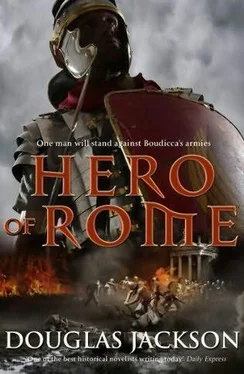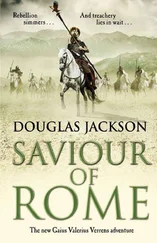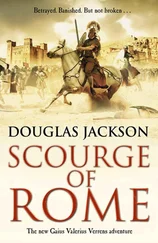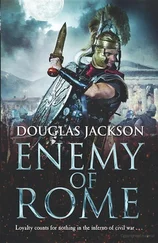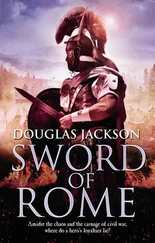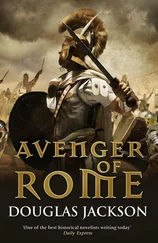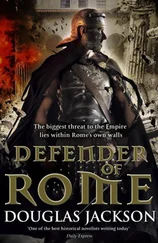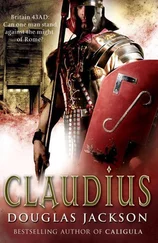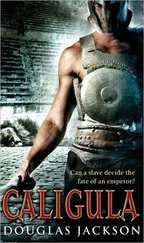Douglas Jackson - Hero of Rome
Здесь есть возможность читать онлайн «Douglas Jackson - Hero of Rome» весь текст электронной книги совершенно бесплатно (целиком полную версию без сокращений). В некоторых случаях можно слушать аудио, скачать через торрент в формате fb2 и присутствует краткое содержание. Жанр: Исторические приключения, на английском языке. Описание произведения, (предисловие) а так же отзывы посетителей доступны на портале библиотеки ЛибКат.
- Название:Hero of Rome
- Автор:
- Жанр:
- Год:неизвестен
- ISBN:нет данных
- Рейтинг книги:5 / 5. Голосов: 1
-
Избранное:Добавить в избранное
- Отзывы:
-
Ваша оценка:
- 100
- 1
- 2
- 3
- 4
- 5
Hero of Rome: краткое содержание, описание и аннотация
Предлагаем к чтению аннотацию, описание, краткое содержание или предисловие (зависит от того, что написал сам автор книги «Hero of Rome»). Если вы не нашли необходимую информацию о книге — напишите в комментариях, мы постараемся отыскать её.
Hero of Rome — читать онлайн бесплатно полную книгу (весь текст) целиком
Ниже представлен текст книги, разбитый по страницам. Система сохранения места последней прочитанной страницы, позволяет с удобством читать онлайн бесплатно книгу «Hero of Rome», без необходимости каждый раз заново искать на чём Вы остановились. Поставьте закладку, и сможете в любой момент перейти на страницу, на которой закончили чтение.
Интервал:
Закладка:
The man chewed his lip but Livius knew him well enough to be certain he had the answer to hand. ‘One hour for the onagers and ballistas, perhaps two more for the big catapults. We had a little trouble at the last river crossing…’
‘You have two hours to put everything in place’ — he also knew the engineer well enough to be certain he had built in the leeway to be able to meet his general’s deadline — ‘two onagers, two ballistas and a single catapult between each pair of watchtowers.’
Later, the heavy chopping sound that was instantly recognizable as the discharge of a ballista brought him from his tent. He looked up at the sun and a particularly sensitive watcher might have noted the shadow of a smile cross the stern features. Two hours less perhaps ten minutes. Good.
‘A ranging shot, sir, short by a dozen yards,’ the engineer announced. ‘A waste of a bolt, but we’ll do better this time. More tension on the rope there!’
Valerius hurried across to join them and watched as the weapon’s commander hauled on the winch, and the two front arms of the ballista bent noticeably back as the ratchet turned noisily. It was a big bow, really, one that shot massive, five-foot arrows with heavy, needle-pointed iron heads. A big mechanical bow encased in a wooden frame and mounted on a cart for easy transportation. They called the arrows ‘shield-splitters’ and he had seen the destruction they could do to an enemy battle line. They would be equally deadly when they fell among the British warriors and the shambling mob of refugees who had sought the false security of the fortress walls. Those walls were now ringed by twenty ballistas and the same number of onagers, the little stone-throwing catapults. Experience told him the onagers would struggle to hurl their ten-pound projectiles over the walls of the inner rampart, but they would add to the chaos and the panic. There would be no such problems for the big catapults. The long, fifteen-foot arm could throw a boulder five times the size of a man’s head from one side of this hill to the other.
‘Weapon armed and ready, sir.’
The engineer scuttled round to the rear of the ballista and stared along the launching ramp towards the fortress. ‘Another elevation.’
The ballista commander lifted the central beam of the weapon a notch and stood back as the engineer again checked the aim, the calculations twitching one by one across his furrowed brow. Eventually he turned back towards Livius. ‘You have the honour, general.’
The legate nodded. ‘Ballista… fire!’
From the eastern gateway of his fortress the Silurian chieftain heard a soft thud at the base of the hill and detected a flicker of movement against the green and brown of the earth below. In the same second some force disturbed the air close by his left shoulder, plucking at the heavy cloth of his cloak, and a moment later he heard a shriek from within the fortress behind him. He turned, knowing what he would see. At first he wasn’t certain whether it was one person or two writhing in the dust. They must have been standing face to face when they were hit. Mother and son? Brother and sister? Lovers? It did not matter now. The ballista bolt had taken the man in the centre of the back, punching through his spine on the downward arc of its trajectory. The impact of the strike had thrown him forward and the point of the five-foot arrow had pierced the woman’s lower body, so that now they squirmed and gasped and quivered in some obscene parody of the act of love.
It had begun.
Livius nodded to the engineer to continue and turned to Valerius. He looked the young tribune up and down. Yes, the boy would do — a credit to his father, even if the father was not a credit to him. Of medium height, but powerfully built with it. Crow-dark hair cropped short beneath the polished helmet, a strong jaw and a sculpted chin with its almost invisible central cleft shadowed with the slightest stubble. Serious eyes of a deep, aqueous green confidently returned his stare. But look a little closer and there was something slightly disturbing about those eyes; a hint of what might be cruelty that would attract a certain type of woman, and hidden in their depths the unyielding hardness which made him the right man for this mission.
He had his orders, but no harm in reinforcing them. ‘Rome does not generally place her tribunes in peril, but in your case I have decided to make an exception. You attack in two days, at dawn. Our Gaulish auxiliaries will carry out a diversionary assault on the western gateway. It will provide you with your opportunity. Once they have engaged the enemy and drawn their reserves you will assault the eastern gate with three cohorts of heavy infantry — more than fifteen hundred men. I have studied the east gate. Once the catapults have done their work it will not hold you for long. Remember, take the fight to them and do not stop killing until there are no more warriors left to kill. That is the price they pay for murdering Rome’s soldiers. The women and children will be taken as slaves. Anyone too old or too sick to march… well, you know what must be done. For Rome!’
For the next two nights Valerius watched as the bombardment battered the rebel defences. He had seen what the artillery could do; the casual, arbitrary malevolence that turned one family into bloody scraps fit for nothing but the dogs, and the next second immolated a dozen warriors in an all-encompassing fireball that left them blackened, smoking imitations of the human form. It was the big catapults, of course, with their boulders that would take out a section of wall or gate and everyone behind it, and the fiery missiles that stank of pitch and sulphur and consumed hut and flesh alike. The assault continued spasmodically through the night, the impact of each death-bringer preceded by the distinct sound of its passage: the almighty, whooshing surge of the giant rocks and the peculiar whup whup whup sound of the fireballs as they spun through the air. Against the awesome violence of the catapults the more numerous projectiles of the smaller weapons would seem almost puny by comparison, but still they would take their toll among the packed ranks of the refugees and the doomed warriors who stood on the ramparts, defiant, as if flesh and blood alone could halt the Roman assault. He tried to blank out images of the exposed bones of shattered children; tried not to imagine the screams of the dismembered or those impaled or blinded by splinters as the wooden palisades and the once mighty gates were smashed flat.
On the morning of the third day, an hour before dawn, the three cohorts of the assault force formed up amid the flickering torchlight on the camp’s parade ground. Valerius stood silently at the centre of the square beside the legion’s eagle and the individual unit standards held aloft by the signiferi, their rank and role emphasized by the wolf-fur cloaks they wore. Each man here had signed up for twenty-five years in the legions. As a military tribune, Valerius had joined for six months, served sixteen because the life agreed with him, and would be sent home in another eight months at most. He gazed slowly round the square, attempting to judge the mood, but in the darkness every face was lost in the shadow of a helmet brim. I’m leading an army of the dead: the thought entered his head before he could suppress it and he shuddered. Was it an ill omen? He made the sign against evil and took a deep breath.
‘You all know me.’ His firm voice carried across the parade ground. ‘And you know I’m only here because your Primus Pilus twisted his leg the other day. He regrets his absence, but not as much as I do.’ A few of them laughed at that, but not many. Valerius knew that some of them would be glad the legion’s feared senior centurion would not be there to hound them up the hill, but the veterans understood that the loss of experience could cost lives. He noticed Crespo, in his distinctive helmet with the curved transverse crest, scowl. ‘You’ve all done this a hundred times before and there’s nothing on that hill you have to fear. When we go, we go fast and we stop for nothing. Anyone who’s wounded on the way is left behind, and that includes the officers. Stay tight, because the tighter we are, the safer we are. I’ll be up front with the First cohort and where I lead, you follow. They won’t be expecting us to come knocking on the front door, so it should be simple.’ This time they did laugh, because they knew it was a lie. The sides of the hill were too steep for a direct assault on the walls. Only the two gateways to the east and the west were vulnerable and the enemy would be waiting behind both. ‘Once we’re inside the gate, it’s over,’ he ended decisively. ‘These people may know how to fight, but they don’t know how to win. We know how to win.’
Читать дальшеИнтервал:
Закладка:
Похожие книги на «Hero of Rome»
Представляем Вашему вниманию похожие книги на «Hero of Rome» списком для выбора. Мы отобрали схожую по названию и смыслу литературу в надежде предоставить читателям больше вариантов отыскать новые, интересные, ещё непрочитанные произведения.
Обсуждение, отзывы о книге «Hero of Rome» и просто собственные мнения читателей. Оставьте ваши комментарии, напишите, что Вы думаете о произведении, его смысле или главных героях. Укажите что конкретно понравилось, а что нет, и почему Вы так считаете.
